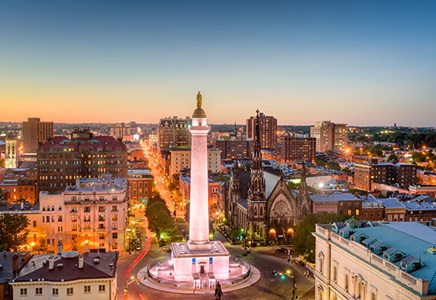Care at Home Pharmacy Residency Programs

Johns Hopkins Care at Home is a diverse and inclusive, fully integrated member of Johns Hopkins Medicine (JHM) serving as an integral component of the healthcare continuum by supporting the JHM mission of safe, quality patient care, education, and research. Johns Hopkins Care at Home strives to be the preeminent home care provider to the Johns Hopkins community by integrating comprehensive home care service and products through a single point of access, utilizing clinical expertise and exhibiting outstanding service excellence. Johns Hopkins Outpatient Pharmacy, which is part of Johns Hopkins Care at Home, provides community and specialty pharmacy services for the Johns Hopkins Community.
Our Resident Community
Frequently Asked Questions
-
Yes, there will be representatives from the Johns Hopkins Community-based Pharmacy and Community-based Pharmacy Administration and Leadership Residency Programs at the Midyear Clinical Meeting. We will be at The Johns Hopkins Care at Home booth during the residency showcase. Please check the showcase directory information to confirm which day and time we will be there. We are only at one of the showcase sessions.
If you are interested in the Community-based Pharmacy Administration and Leadership (CPAL) 2-year residency, participation in the Personnel Placement Services (PPS) is highly encouraged. Information will be provided at PPS and preliminary interviews will be held.
-
Yes, we participate in several local and regional showcases. In the past, we have participated in MSHP Residency Showcase, APhA MRM Career Showcase, and showcases at regional colleges of pharmacy. Please check the specific organization or school for details.
-
Johns Hopkins Care at Home Pharmacy Services encompasses 13 pharmacies in the Baltimore area, including at the Johns Hopkins Hospital East Baltimore campus and Bayview Medical Center. Each pharmacy is open to all patients and specializes in certain patient populations, including discharge patients, HIV/AIDS, cancer, geriatrics, and pediatrics. Often, these specialties align with nearby clinics. In addition, community pharmacies provide medication therapy management, immunizations, home infusion therapies, and clinical management of chronic diseases, including solid organ transplant, hepatitis C, multiple sclerosis, inflammatory conditions (Crohn’s disease, psoriasis, rheumatoid arthritis).
-
Residents receive a list of goals and objectives at the beginning of each rotation. At the end of the concentrated rotations, they meet with their preceptor to review their performance. For longitudinal rotations, residents review their performance with their preceptor quarterly. On a quarterly basis, the director of the residency program provides residents with an evaluation of their progress based on preceptors’ comments.
-
Mentorship is an integral part of the residency program. Residents will be assigned a facilitator who will support them throughout their full residency year. Additionally, facilitators review the resident’s development plan and collaborate with their preceptors and RPD to ensure that residents progress through the program. In addition, other pharmacists within the organization serve as informal mentors to our residents.
-
Residents are required to design, conduct, and evaluate a major project related to an aspect of pharmacy practice during the residency year that aligns with the organizations strategic priorities.
-
Residents are required to deliver one ACPE-accredited continuing education presentation. They also must provide in-services to the pharmacy teams throughout the year depending on the rotation. In addition, residents present the results of their major project to the preceptors before presenting the results at a regional residency conference: the Eastern States Residency Conference.
-
Consistent with the American Society of Health-System Pharmacists Commission on Credentialing standards, the Hopkins residency experience is primarily a practical, rather than didactic or classroom experience. Practice skills are developed throughout the program in all aspects of pharmaceutical care. Residents will staff in the pharmacy one shift during the week and every third weekend. Residents primarily work at the Johns Hopkins Community Pharmacy at Bayview location. This is a diverse location which services patients discharged from the Bayview Medical Center, as well as individual s from the local community including pediatric, adult and geriatric patients. Residents are involved with verification, drug information questions, vaccinations and patient education.
-
Residents are required to actively participate in at least one professional pharmacy organization during their residency year. The RPD, facilitators, and preceptors assist the resident to identify roles within a local or national organization that align with their interests.
Residents also are able to engage in numerous opportunities to support the local community through events such as Drug Take Back Day, vaccination clinics, community and support groups. -
Residents are encouraged to obtain licensure in the state of Maryland as soon as possible to maximize their training as a pharmacist. If residents are not licensed within 120 days of their start date, they may be dismissed from the program.
-
A resident’s stipend is approximately $57,000 for PGY1 pharmacy residents and approximately $60,000 for PGY2 residents.
-
Monetary funding will also be available for residents to attend selected professional meetings.
-
Residents receive a comprehensive benefits package, including health care, dental, eye care, vacation and sick days during the residency year.
-
Residents have access to the William H. Welch Medical Library located on the Johns Hopkins’ East Baltimore Medical campus. One of the largest medical libraries in the country, the Welch Library houses medical literature in all fields of teaching, patient care and research represented at Hopkins. It contains more than 267,000 bound volumes as well as an extensive audiovisual collection.
-
Residents are provided with desk space and computers.
-
There are several parking options from which residents may choose.
-
The tuition for the MBA or MS degree with the Johns Hopkins Carey Business School is supported by the Johns Hopkins Care at Home.
Experience Baltimore

Called “Charm City” for a reason, Baltimore is a place that has a little something for everybody. Baltimore is a spirited city – a unique blend of historic charm, cultural heritage and urban vitality. With hanging out at the Inner Harbor, attending neighborhood festivals, biking to school and more, Johns Hopkins medical students, graduate students and residents have a lot to love about Baltimore.





